 Li Na crashes Belinda Bencic in 2nd round at Australian Open
Li Na crashes Belinda Bencic in 2nd round at Australian Open
 Shocking moments when PLA's weapons open fire
Shocking moments when PLA's weapons open fire Famous Lanzhou beef noodles
Famous Lanzhou beef noodles Armed Police hold anti-terrorism drill in SE China's Xiamen
Armed Police hold anti-terrorism drill in SE China's Xiamen Harbin Int'l Ice and Snow Festival opens
Harbin Int'l Ice and Snow Festival opens 'Jin' named the word of the year by cross-strait netizens
'Jin' named the word of the year by cross-strait netizens Chinese scientific expedition goes to build new Antarctica station
Chinese scientific expedition goes to build new Antarctica station
 Chinese naval escort fleet conducts replenishment in Indian Ocean
Chinese naval escort fleet conducts replenishment in Indian Ocean 17th joint patrol of Mekong River to start
17th joint patrol of Mekong River to startShanghai will shut schools and order cars off the road in cases of severe smog as the city yesterday rolled out emergency measures to tackle air pollution.
They include a new air pollution alarm system, with blue, yellow, orange and red alarms indicating different levels of air quality.
When the red alarm is raised, apart from closure of primary and middle schools and kindergartens, 50 percent of official vehicles will be taken off the roads, large-scale outdoor activities will be canceled, and construction will be halted.
Shanghai previously had a two-level warning system for air pollution, issued last March. A warning of “heavy pollution” was issued when the air quality index reached 200 for 12 hours, and a warning for “severe pollution” when it reached 300 for six hours.
However, in practice the system proved unsatisfactory. In November, it took 27 hours to issue a heavy pollution warning, which led to a delay in schools being notified.
The Shanghai Environmental Protection Bureau said there were 241 days of good or excellent air quality last year, with the index below 100. Two days were severely polluted with the AQI over 300; 21 days heavily polluted (201-300); 29 moderately polluted (151-200), and 72 slightly polluted (101-150).
PM2.5, referring to tiny particles hazardous to health, was the main pollutant for 70 percent of the 124 polluted days. According to a target set by the Ministry of Environmental Protection, Shanghai is to reduce PM2.5 by 20 percent within five years.
The air quality index even surpassed 500, the top reading in the chart, in early December last year.
The air quality in January, November and December last year was reported to be the worst for the past five years.
In the new warning regime, a red alarm is triggered when the AQI is forecast to be over 450 for the next 24 hours, and will be made public via TV and text messages, and on official sites of government departments and public service platforms.
When a red alarm is issued before 6am on any day, schools and kindergartens will automatically suspend classes, no matter how much the air improves throughout the day.
When a red alarm is issued after 6am and before the start of classes, schools and kindergartens will not close but there will be no outdoor activities. However, students who don’t attend class or arrive late will not be counted as absent.
Teachers and school staff are still required to be at work.
“Schools and kindergartens will still operate in case of a red alarm. Some students might miss the alarm and still attend class, and should still be taken care of by the school,” said Wang Ping, vice director of the Shanghai Education Committee.
“There are also occasions when parents are too busy to take care of the children, and schools should still take the responsibility.”
Schools and kindergartens will also be closed when weather alerts are issued in the event of extreme conditions such as typhoons, rainstorms, snowstorms and frozen roads. Boarding schools will cease outdoor activities.
The lowest air quality alarm, blue, will be issued when the city’s AQI is forecast to be between 201 and 300 over the following 24 hours. If such a reading is expected to last for 48 hours, the alarm will turn to yellow.
An orange alarm will be issued when the AQI is predicted to be between 301 and 450 over the next 24 hours.
Potential sources of pollution — some enterprises and construction sites, for example — will receive reminders when a blue alarm is issued. Relevant government departments and organizations will be required to strengthen management over pollution sources.
Under a yellow alarm, the city will partially close construction sites. Factories discharging pollutants will be suspended and vehicles with construction materials banned from the roads.
Under an orange alarm, enterprises in the oil, chemical, steel and cement areas will be required to suspend operations.
Schools and kindergarten should stop outdoor activities and there should be no construction work outdoors.
 In photos: Ten 'tuhao' devices in 2013
In photos: Ten 'tuhao' devices in 2013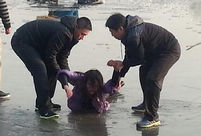 College students saved from an ice hole by brave citizens
College students saved from an ice hole by brave citizens Gallery: Top 10 box office hits in 2013
Gallery: Top 10 box office hits in 2013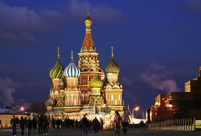 Beautiful churches around the world
Beautiful churches around the world Yang Mi, Hawick Lau hold wedding in Bali
Yang Mi, Hawick Lau hold wedding in Bali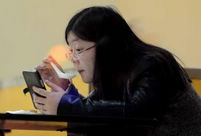 'Phubbing' people seen everywhere
'Phubbing' people seen everywhere World's biggest snack shop in China
World's biggest snack shop in China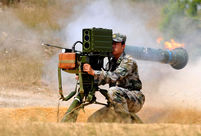 Shocking moments when PLA's weapons open fire
Shocking moments when PLA's weapons open fire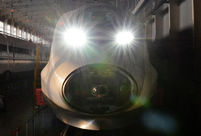 World's fastest train CRH380A assembled in E China
World's fastest train CRH380A assembled in E China Chinese naval escort taskforce repels 4 suspicious vessels
Chinese naval escort taskforce repels 4 suspicious vessels Should highways charge tolls on New Year's Eve?
Should highways charge tolls on New Year's Eve? Foreign banks optimistic about China's growth prospect
Foreign banks optimistic about China's growth prospect  Li Na crashes Belinda Bencic in 2nd round at Australian Open
Li Na crashes Belinda Bencic in 2nd round at Australian Open New top ten sceneries of Qiandao Lake
New top ten sceneries of Qiandao Lake World's weekly photos (1.6-1.12)
World's weekly photos (1.6-1.12)Day|Week|Month